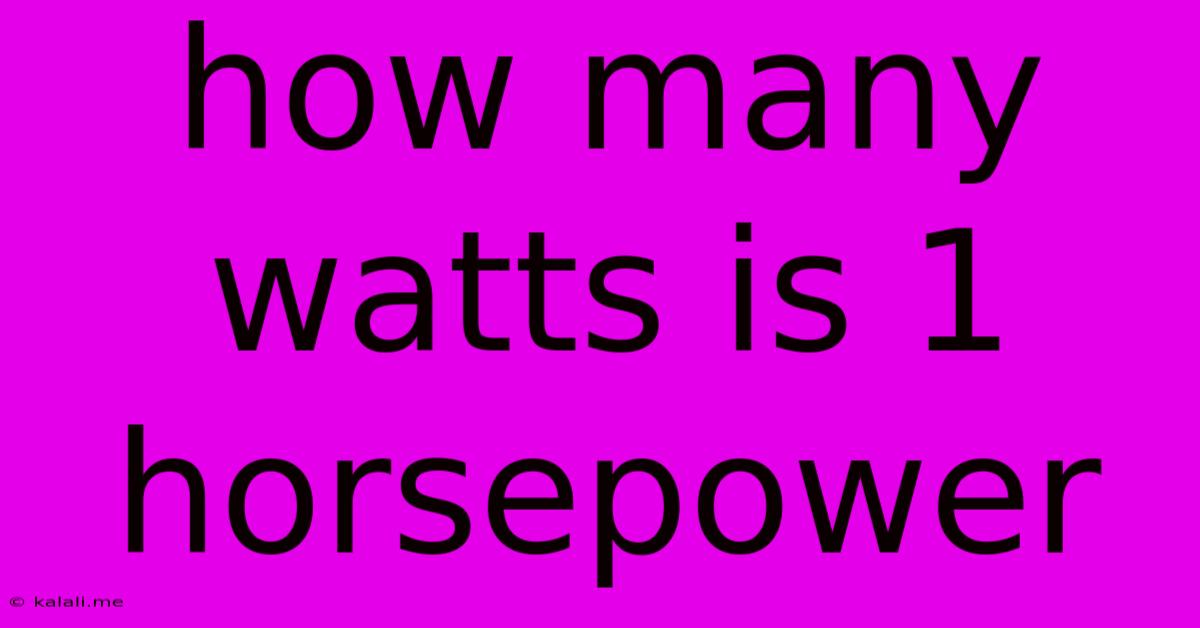How Many Watts Is 1 Horsepower
Kalali
Jun 13, 2025 · 3 min read

Table of Contents
How Many Watts is 1 Horsepower? Understanding Power Conversion
The question of how many watts are in a horsepower is a common one, particularly for those working with engines, motors, or comparing power outputs across different systems. This article will delve into the conversion, explain the underlying concepts, and offer some helpful context. Understanding this conversion is crucial for anyone needing to compare power ratings between metric (watts) and imperial (horsepower) systems.
What is Horsepower?
Horsepower (hp) is a unit of measurement of power, or the rate at which work is done. It's an imperial unit, historically used to measure the power of steam engines by comparing them to the power of a horse. While somewhat outdated in many contexts, it remains prevalent in discussions about engine power, especially for vehicles.
What is a Watt?
A watt (W) is the SI unit of power, representing the rate of energy transfer. One watt is equal to one joule per second. It's a more universally accepted unit used across various scientific and engineering disciplines.
The Conversion: Horsepower to Watts
The exact conversion depends slightly on the type of horsepower used (mechanical, metric, electrical, etc.). However, the most commonly used conversion factor is:
1 mechanical horsepower ≈ 745.7 watts
This means that one mechanical horsepower is approximately equal to 745.7 watts. It's important to note the "approximately" because slight variations can exist depending on the specific definition of horsepower being used. For most practical purposes, this conversion is accurate enough.
Understanding the Context
The conversion isn't simply a mathematical equation; understanding the underlying physical principles is vital. Both horsepower and watts measure the rate at which work is done. The difference lies primarily in the systems of measurement—imperial versus metric.
- Applications of Horsepower: Commonly seen in specifications for internal combustion engines (cars, motorcycles, generators), pumps, and other machinery.
- Applications of Watts: Widely used for electrical power (light bulbs, appliances), mechanical power in metric systems, and various other energy calculations.
Practical Implications and Examples
Knowing the conversion allows for easy comparisons. For example:
- A 100 horsepower engine is approximately equivalent to a 74,570-watt engine.
- A 500-watt appliance consumes roughly 0.67 horsepower.
Beyond the Simple Conversion: Factors to Consider
While the conversion itself is straightforward, it's crucial to consider several factors:
- Type of Horsepower: Different types of horsepower exist (e.g., mechanical, metric, boiler horsepower, electrical horsepower), each with slightly different conversion factors.
- Efficiency: The actual power output of a machine might be less than its rated power due to inefficiencies in the system. This is especially relevant when dealing with mechanical systems where friction and other losses can significantly reduce the effective power.
- Units of Measurement: Always double-check the units being used to avoid errors in calculation and ensure consistency across the problem.
In conclusion, while the simple answer is that 1 horsepower is roughly equal to 745.7 watts, a deeper understanding of the units, their origins, and practical applications provides a more complete picture of power measurement and conversion. Remember to always consider potential variations and the context of the application when working with these units.
Latest Posts
Latest Posts
-
In Analyzing A Series Rlc Circuit The Reference Is The
Jun 14, 2025
-
What Is The Prime Factorization For 225
Jun 14, 2025
-
Equation For Torque In Dc Motor
Jun 14, 2025
-
What Is The Lcm Of 4 6 10
Jun 14, 2025
-
Which Tributary Of The Mississippi Is The Longest
Jun 14, 2025
Related Post
Thank you for visiting our website which covers about How Many Watts Is 1 Horsepower . We hope the information provided has been useful to you. Feel free to contact us if you have any questions or need further assistance. See you next time and don't miss to bookmark.